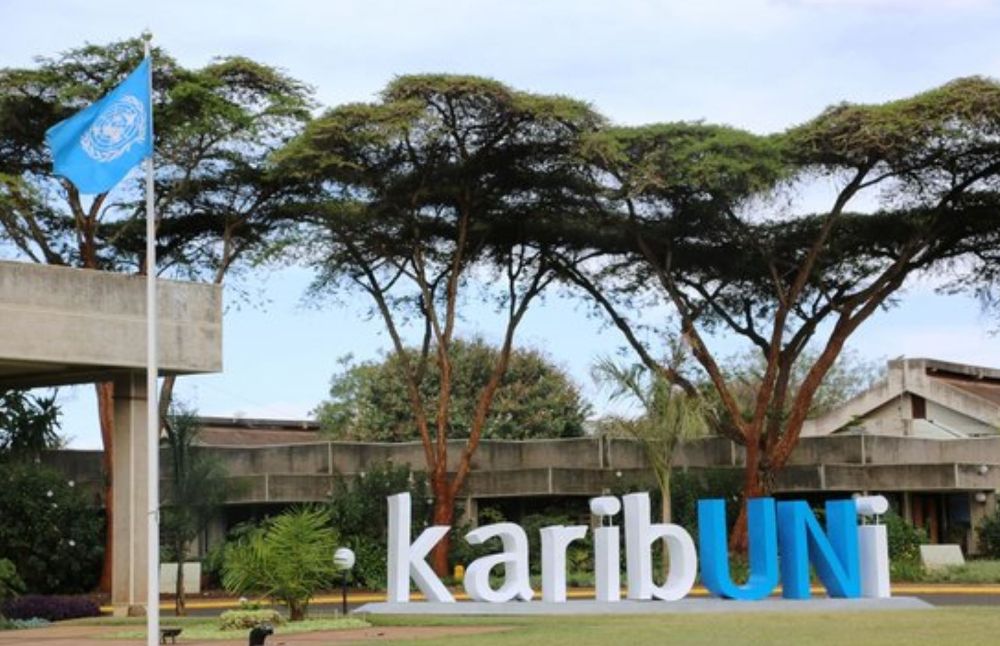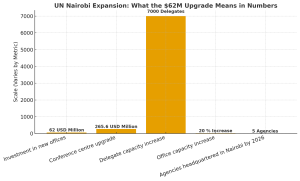Business
Nairobi UN Complex Secures $62 Million Upgrade, Cementing Status as Africa’s Diplomatic Capital

When the United Nations unveiled plans for a $62 million upgrade of its Nairobi headquarters, the announcement was more than just a real estate development. It marked a turning point in Kenya’s rise as a center of international diplomacy, elevating Nairobi from a regional hub into one of the world’s most critical stages for multilateral decision-making.
The project, which includes new office blocks and extensive renovations within the UN’s 140-acre complex in Gigiri, will boost capacity by 20 percent, making room for more agencies, funds, and global programs to shift operations to Kenya.
Coupled with a $265.6 million state-of-the-art conference center that will accommodate up to 9,000 delegates up from today’s 2,000 the investment is a clear signal: Nairobi is no longer a secondary outpost; it is becoming central to the UN’s future.
A Headquarters in Africa, At Par with New York
The Nairobi UN Complex is already unique. It is the UN’s only headquarters in Africa, and the largest such facility anywhere in the world.
It currently hosts the United Nations Environment Programme (UNEP) and UN-Habitat, both of which are headquartered exclusively in Kenya.
By 2026, it will also house global offices for UNICEF, UNFPA, and UN Women, consolidating Nairobi as the nerve center of the UN’s social and environmental agenda.
UNON Director General Zainab Hawa Bangura framed the expansion as an effort to bring Nairobi “at par with New York and Geneva,” underscoring the ambition to turn Kenya into a stage for top-tier global negotiations.
Soft Power and Strategic Geography
At the heart of this move lies a shift in global power dynamics.
The decentralization of UN operations reflects a broader reform agenda: to relocate parts of the bureaucracy away from the costly, Western-centric hubs of Europe and North America, and into strategically positioned, cost-effective cities in the Global South.
For Kenya, this is a coup in soft power. By anchoring UN headquarters in Nairobi, the country gains influence over how global policies are shaped particularly those affecting Africa and developing economies.
Nairobi’s position as a diplomatic capital also means the country will increasingly play host to negotiations on climate change, peacekeeping, migration, and sustainable development issues that directly impact its own national priorities.
Economic Windfall and Urban Diplomacy
Beyond the symbolic, the economic dividends are enormous.
Large-scale summits and conferences attract high-level delegations, media attention, and investment.
Nairobi’s hotels, airlines, restaurants, and transport networks are already gearing up to serve thousands more diplomats and staff.
Analysts estimate billions of shillings in direct and indirect benefits for the local economy once the expansion is complete.
There are also urban development implications. Gigiri is already one of Nairobi’s most secure and cosmopolitan enclaves, home not only to the UN but also to dozens of embassies.
The new investments are expected to further transform the neighborhood into one of the world’s most important zones of “urban diplomacy,” akin to Midtown Manhattan in New York or the Palais des Nations district in Geneva.
A Vote of Confidence in Kenya’s Stability
Equally significant is the trust this investment represents.
In a region often marked by political turbulence, the UN’s decision to double down on Nairobi signals confidence in Kenya’s relative stability and reliability as a host for sensitive international operations.
For a country that positions itself as a bridge between Africa and the world, this vote of confidence enhances its global profile.
Challenges Ahead
Still, the expansion is not without challenges. Nairobi will need to strengthen infrastructure—roads, public transport, security systems, and digital connectivity—to support the growing diplomatic community.
There is also the political test: maintaining stability and neutrality in a polarized domestic environment while hosting global negotiations.
Nairobi: The Global South’s Diplomatic Capital
From its beginnings as a colonial railway depot to its rise as East Africa’s financial and tech hub, Nairobi has always been a city of reinvention.
With the UN’s $62 million expansion and billions more in pipeline projects, the city is now on course to establish itself as the diplomatic capital of the Global South—a place where the world comes not just to talk about Africa, but to let Africa shape the global conversation.
Kenya Insights allows guest blogging, if you want to be published on Kenya’s most authoritative and accurate blog, have an expose, news TIPS, story angles, human interest stories, drop us an email on [email protected] or via Telegram
-

 Grapevine5 days ago
Grapevine5 days agoAlleged Male Lover Claims His Life Is in Danger, Leaks Screenshots and Private Videos Linking SportPesa CEO Ronald Karauri
-

 Lifestyle1 week ago
Lifestyle1 week agoThe General’s Fall: From Barracks To Bankruptcy As Illness Ravages Karangi’s Memory And Empire
-

 Americas2 weeks ago
Americas2 weeks agoEpstein Files: Bill Clinton and George Bush Accused Of Raping A Boy In A Yacht Of ‘Ritualistic Sacrifice’
-

 Investigations1 week ago
Investigations1 week agoEpstein Files: Sultan bin Sulayem Bragged on His Closeness to President Uhuru Then His Firm DP World Controversially Won Port Construction in Kenya, Tanzania
-

 Business2 weeks ago
Business2 weeks agoABSA BANK IN CRISIS: How Internal Rot and Client Betrayals Have Exposed Kenya’s Banking Giant
-

 News2 weeks ago
News2 weeks agoAUDIT EXPOSES INEQUALITY IN STAREHE SCHOOLS: PARENTS BLED DRY AS FEES HIT Sh300,000 AGAINST Sh67,244 CAP
-

 Business2 weeks ago
Business2 weeks agoKRA Can Now Tax Unexplained Bank Deposits
-

 News1 week ago
News1 week agoState Agency Exposes Five Top Names Linked To Poor Building Approvals In Nairobi, Recommends Dismissal After City Hall Probe















